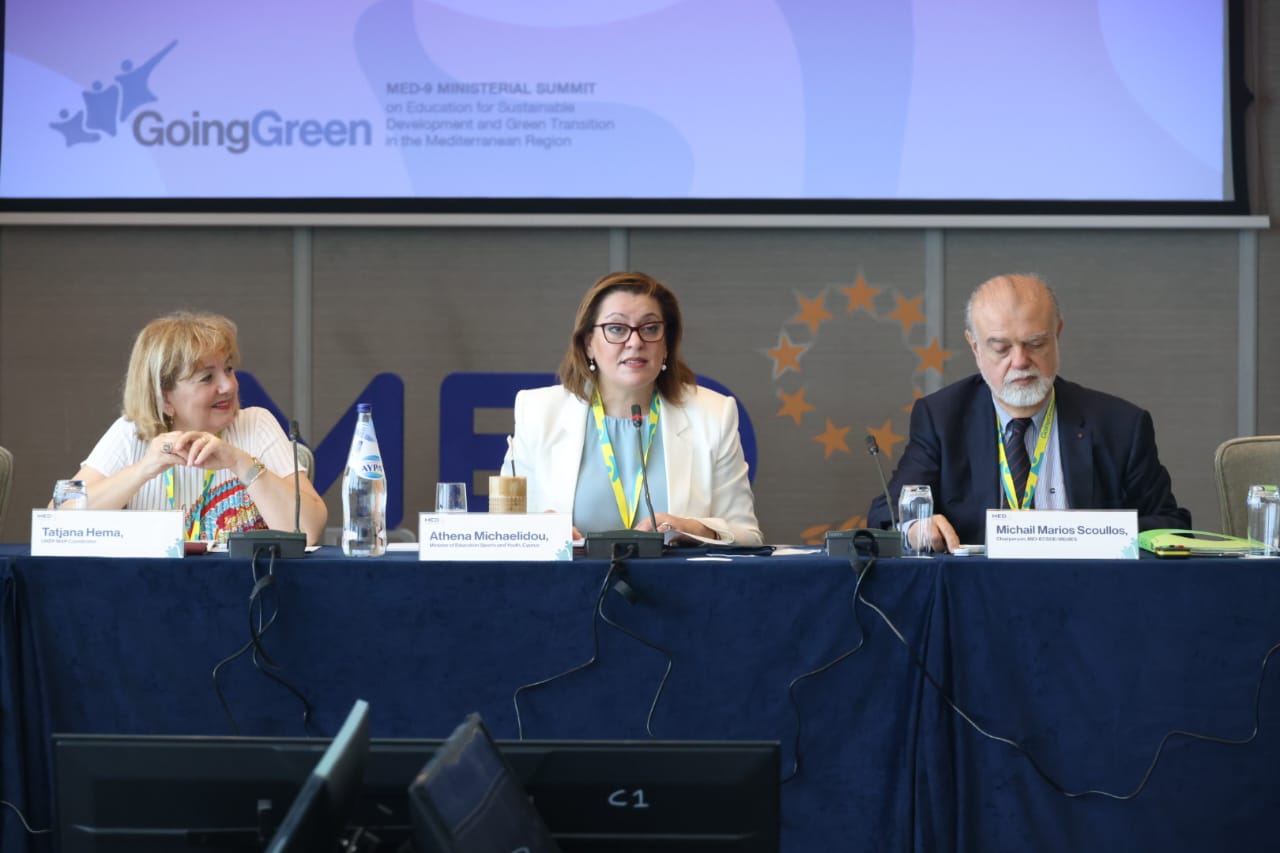Press Releases

27-06-2024 11:52
Cyprus Intervention by the Minister of Education, Sport and Youth, Dr Athena Michaelidou, at the MED9 Ministerial Summit on ESD and Green Transition in the Mediterranean Region
Cyprus is pioneer in the field of Education for Sustainable Development (ESD) and is considered a leading country in the field. It is one of the few countries that has integrated this subject since 2008, systematically in a unified way through the National Action Plan for Education for Environment and Sustainable Development (NAPEESD). The National Action Plan established ESD on all levels of formal, informal and non-formal education in a systemic and concise way.
Recently, the Ministry of Education, Sports and Youth (MESY) revised its National Strategy on ESD under the title “National Strategy for Education and Sustainable Development and Green Transition 2030”. Its revision for the period between 2021-2030 is imperative and envisions a comprehensive and holistic approach to ESD, integrating formal, non-formal, informal education and lifelong learning. It also envisions the creation of sustainable education institutions, aligning with the social, pedagogical, and organizational aspects of sustainability.
Cyprus is the only country in the world that is recognized as an exemplar case of integrating ESD holistically and for establishing a permanent Unit for Education for Sustainable Development within the competent ministry. This unit of the ministry is responsible for integrating, monitoring and updating all the actions for ESD in formal, non-formal and informal education at all levels and in civil society.
Some of the main priorities that I would like to mention are:
The revision of the ESD Curricula. Cyprus is the only country that since 2010 has included officially the ESD curriculum in pre-primary and primary education. Recently, the curricula were revised on a competence-based basis, aiming to empower students to undertake individual actions and engage in collective actions that will lead to change for sustainability and green transition. An innovative reform that is under development is the introduction of the ESD curriculum in secondary education, aiming to close the gap that exists at this level of education on ESD and Green Transition.
The establishment of the Whole School Approach and ESD is also an important reform that has been introduced in the education system of Cyprus, aiming to transform schools from knowledge-based institutions to open learning communities for sustainability and green transition. You will have the opportunity at the specific session to be informed about the Cyprus developments in this field.
Also, efforts in Cyprus are already under way to develop a certification scheme for sustainable schools, based on the Whole School Approach. This is a central policy initiative for schools to reach sustainability.
Just to note that all these policies are accompanied with the proper teachers and principals’ professional development courses on ESD, in both compulsory and optional participation, with mentoring schemes, school-based seminars and seminars in real-world environments.
Another priority is to create green learning spaces and sustainable school infrastructures. This priority will be elaborated during Session 3, which focuses on both whole school and whole institution approach.
Cyprus is the only country that established the more complete structure of non-formal education. We have created the Governmental Education Center with seven Centers of non-formal education on ESD. More than 50.000 students participate every year from all education levels in its programs. More than 150 environmental programs are offered on one-day, three-day and five-day basis.
Challenges that have emerged are related to the establishment of monitoring and evaluation mechanisms for ESD at the level of educational policies, programs and schools.
First, the implementation of holistic school approaches at all levels of education in matters of sustainability and green transition (contents learning, pedagogical approaches, upgrading building infrastructures based on the principles of sustainability, partnerships and collaborations between schools and society, etc.),
Second, the utilization of digital education and the strengthening of the digital capacity of teachers and students in the learning and educational process for sustainability and the green transition,
Third, the further development of non-formal education and the promotion of intergenerational communication programs, but also the preparation of trainees for the green transition,
Fourth, the innovation and entrepreneurship and the development of programs that will connect the school with the labor market and will strengthen the abilities of trainers and trainees, as well as their professional orientation towards the circular economy and green transition.
The measures that are taken to overcome these challenges are the following: (1) the creation of educational material for the goals of the Global Agenda (modern and asynchronous learning), (2) the creation of a framework for certification of educational professional development programs for sustainability and green transition, (3) promotion of community and school action programs based on the goals of the global agenda, (4) actions to raise awareness and inform local populations, (5) research and evaluation, the transfer of know-how, policies, educational material and finally (6) the development of joint programs through bilateral and tripartite collaborations for example Carpathian ESD network, Egypt, Greece, Italy, Spain etc.
The Mediterranean Strategy on ESD, which was renewed and endorsed at the 9th Ministerial Meeting here in Cyprus in 2022, plays a vital role in addressing these challenges. This strategy provides a comprehensive framework for joint action, promoting regional cooperation and the sharing of best practices. It helps us leverage the collective expertise and resources of the Mediterranean countries, fostering a collaborative approach to sustainable development and serves as a powerful tool for strengthening ESD in Cyprus and across our region.
(IP/KK)
Relevant Press Releases


04-11-2024 13:18
Announcement by the Cyprus Academy of Sciences, Letters, and Arts





